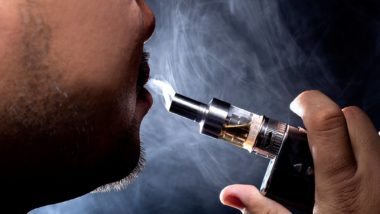 Vaping and health effects of inhaling nicotine and other byproducts from e-cigarettes can lead to increased risks of seizures, strokes, heart attacks and lung damage, according to researchers.
Vaping and health effects of inhaling nicotine and other byproducts from e-cigarettes can lead to increased risks of seizures, strokes, heart attacks and lung damage, according to researchers.
Originally marketed as devices to help people quit smoking cigarettes, the cessation aids themselves have become popular devices and are now associated with nicotine addiction.
In fact, according to the 2019 World Health Organization (WHO) Report on the Global Tobacco Epidemic, “There is insufficient independent evidence to support the use of these products as a population-level tobacco cessation intervention to help people quit conventional tobacco use.”
Vaping has become popular with many people who are too young to legally buy tobacco products. With the introduction of the JUUL e-cigarette in 2015, a small vaping pen that looks like a USB device, smoking among young people became cool again.
While many kids believe they are only inhaling flavored water vapor, scientists and doctors have found one JUUL pod contains more nicotine than an entire pack of cigarettes.
The flavorings aren’t innocent, either. The University of California – Riverside discovered 99 different chemical flavorings among the top 20 vaping liquids. Just one packet contained anywhere from 22 to 47 different chemicals, depending on which brand and flavor was tested. A particularly toxic chemical, ethyl maltol, was found in more than half of all vaping liquids researchers tested.
Vaping and Health Side Effects
According to a study regarding vaping and health effects from the Stanford School of Medicine released earlier this year, the vaping liquids used in JUUL and similar vaping devices may increase the risk of heart disease. Researchers found that vaping liquids damage endothelial cells that are the building blocks of the lining of a blood vessel. Cells showed signs of DNA damage and actually died when mixed with vaping liquids.
In the U.S., more than 100 seizures have been linked to e-cigarette use, likely because of the high dose of nicotine delivered with each inhalation. In April, the FDA said it had received 35 reports of seizures, and some had occurred after just a few inhalations. As of August 7, the FDA had received 127 reports of seizures or seizure-like neurological problems associated with vaping.
Dr. Lawrence Weinstein is the chief medical officer for the American Addiction Centers. In an interview with CNET, Dr. Weinstein said tests have shown some vaping liquids have less nicotine than stated on the labels, but others have been shown to contain up to 52 percent more nicotine than the label says. He said that can make a big difference, especially to young teenagers who are more apt to experience nicotine poisoning.
Anyone under the age of 25 is more at risk of psychological side effects from nicotine, too, because the part of the brain used to make decisions, express one’s personality and make logical conclusions is not fully developed until a person is 25 or 26 years old. As a result of the immaturity of the brain, a young person who starts vaping is at a greater risk of addiction, mood disorders such as depression, and a permanent impairment of their impulse control.
Join a Free JUUL E-Cigarette Class Action Lawsuit Investigation
If you or your child suffered seizures after vaping with a JUUL e-cigarette, you may benefit from participating in a free JUUL class action lawsuit investigation.
This article is not legal advice. It is presented
for informational purposes only.
ATTORNEY ADVERTISING
Top Class Actions is a Proud Member of the American Bar Association
LEGAL INFORMATION IS NOT LEGAL ADVICE
Top Class Actions Legal Statement
©2008 – 2026 Top Class Actions® LLC
Various Trademarks held by their respective owners
This website is not intended for viewing or usage by European Union citizens.
Get Help – It’s Free
Join a Free JUUL E-Cigarette Class Action Lawsuit Investigation
If you qualify, an attorney will contact you to discuss the details of your potential case at no charge to you.
PLEASE NOTE: If you want to participate in this investigation, it is imperative that you reply to the law firm if they call or email you. Failing to do so may result in you not getting signed up as a client or getting you dropped as a client.
E-mail any problems with this form to:
[email protected].












